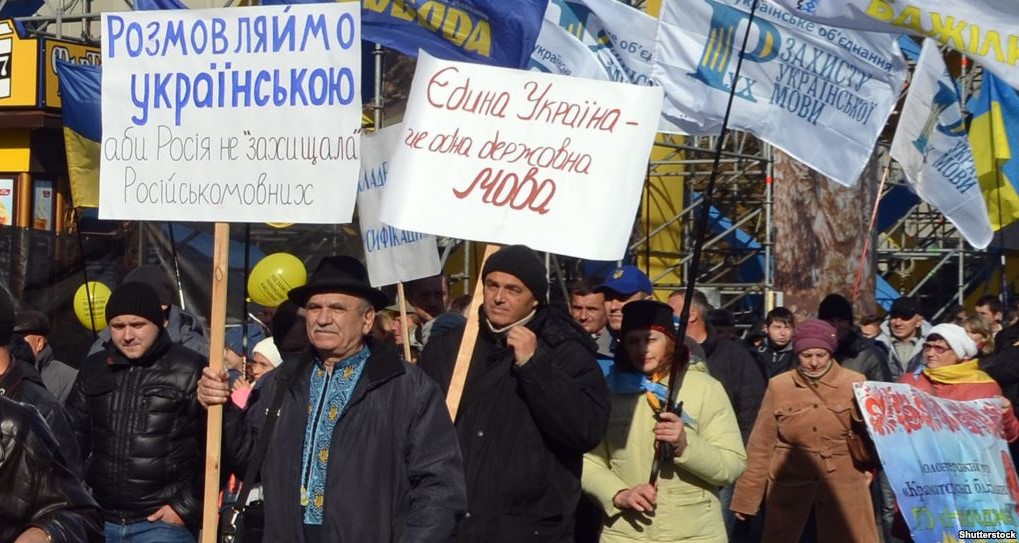Most Ukrainians say their language is an important aspect of Ukraine’s independence

A survey just published has found that a large majority of Ukrainians view the Ukrainian language as an important attribute of the country’s independence and support it being the language spoken by the country’s leaders and civil servants, and in education. A smaller, although still absolute, majority do not consider that the rights of Russian-speakers are infringed in Ukraine. This is quite different from the claims that Russia constantly makes, however there are noticeable geographical differences, even without occupied Crimea and Donbas where the Democratic Initiatives Foundation / Razumkov Centre survey could not be carried out.
The survey took place on the eve of Independence Day (from 14 – 19 August), and began with the question about language and independence. The geographical divide here was fairly pronounced, with a mere 3% of people in western oblasts not considering the Ukrainian language to be an important aspect of Ukrainian independence, in marked contrast to the 49% in the east who either probably or definitely did not view it in this light, and 33,2% in the south.
Although the same broad differences can be seen everywhere, it was noticeable that in all parts of the country, a significant majority said that the leaders of the country and civil servants should speak Ukrainian in working hours, and that all Ukrainian citizens must know the state language. 77% of Ukrainians as a whole said that most subjects in all educational institutions should be taught in Ukrainian. Although the figures differed from the near 100% support for this in the west, an absolute majority agreed with this everywhere (88,3% in the central region of Ukraine; 68% in the south; and 65,2% in the east. While the demand that at least 75% of television content should be in Ukrainian was supported by an absolute majority (65%) of respondents as a whole, such language quotas were only supported by 46% in the south, and 38% in the east (with 40% and 56%, respectively, against them).
Asked what status the Russian language should have in Ukraine, 66% say that it can be freely used in private life, but that there should remain only one state language. 18% think it would be appropriate to give Russian official language status in certain regions, while 13% support it becoming a state language everywhere. There was an absolute majority in support of one single state language everywhere, except in the east of Ukraine, where only 33% supported having only one state language, while 32% thought Russian should be given regional language status, and 31% would favour having both Ukrainian and Russian as state languages.
Respondents were asked whether they considered that the rights of Russian speakers are violated in government-controlled Ukraine, and whether Ukrainian speakers’ rights are infringed in occupied Crimea and Donbas. As mentioned, 52% overall did not see infringements of Russian speakers’ rights, however in the east a majority considered that these rights are either constantly violated (21,1%) or in some cases (39,8%).
Only 51% replied that the language rights of Ukrainian speakers are violated in occupied Crimea and Donbas, with 30% in the east saying that they were not violated. It is interesting that there was a huge majority in the south (71%) who replied that it was hard to say. This does appear to indicate a failure by the Ukrainian media to give sufficient coverage to the situation in occupied territories, where there are effectively no Ukrainian-language media or education in Ukrainian.
Russia’s claims that Russian-speakers were facing discrimination in Ukraine go back a long way, but became extremely aggressive and extreme in 2014, with Moscow effectively claiming such invented discrimination as the excuse for its invasion and annexation of Crimea and military aggression in eastern Ukraine. In 2014, in particular, Russia kept coming out with assertions about the supposed “genocide of Russian-speakers” in Donbas.
It most recently got called to account by the same Democratic Initiatives Foundation in June 2020, when Russia’s representative to the OSCE, Alexander Lukashevich, tried to push the normal line about violations by ‘quoting’ an earlier DIF/ Razumkov Centre survey. This had, in fact, reported results similar to those in the recent study, however Lukashevich saw fit to distort the results. DIF responded with a statement circulated publicly and sent to the OSCE accusing the Russian OSCE Representative of manipulating the findings in order to conjure up ‘discrimination of Russian speakers’.
See: Russia caught lying to OSCE about ‘persecution’ of Russian-speakers in Ukraine





